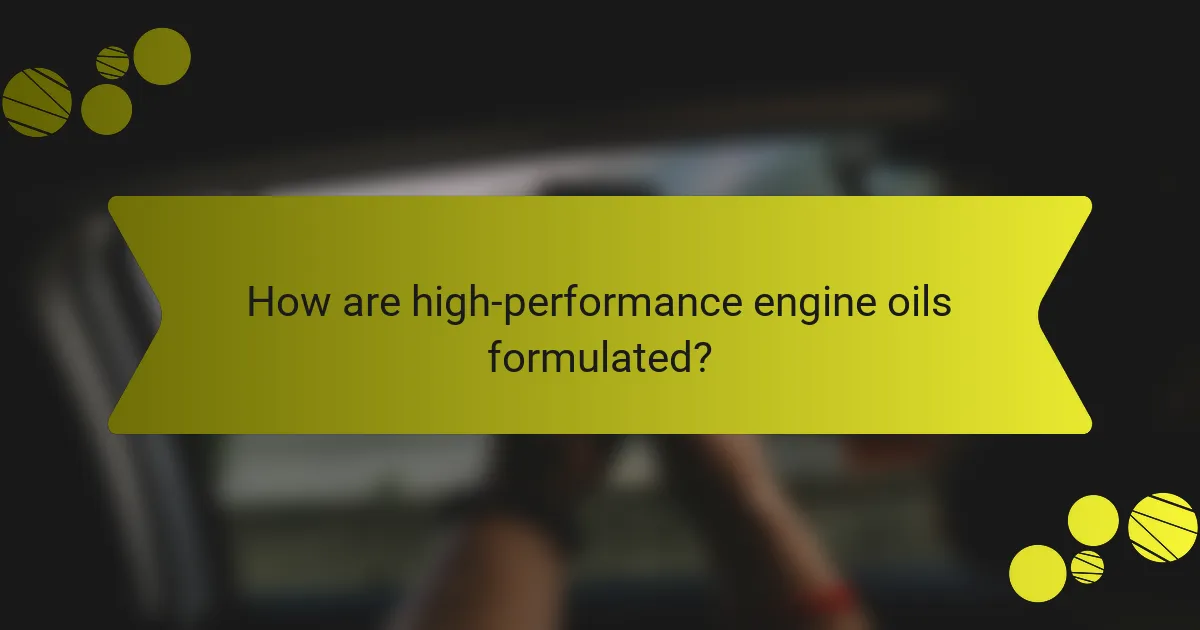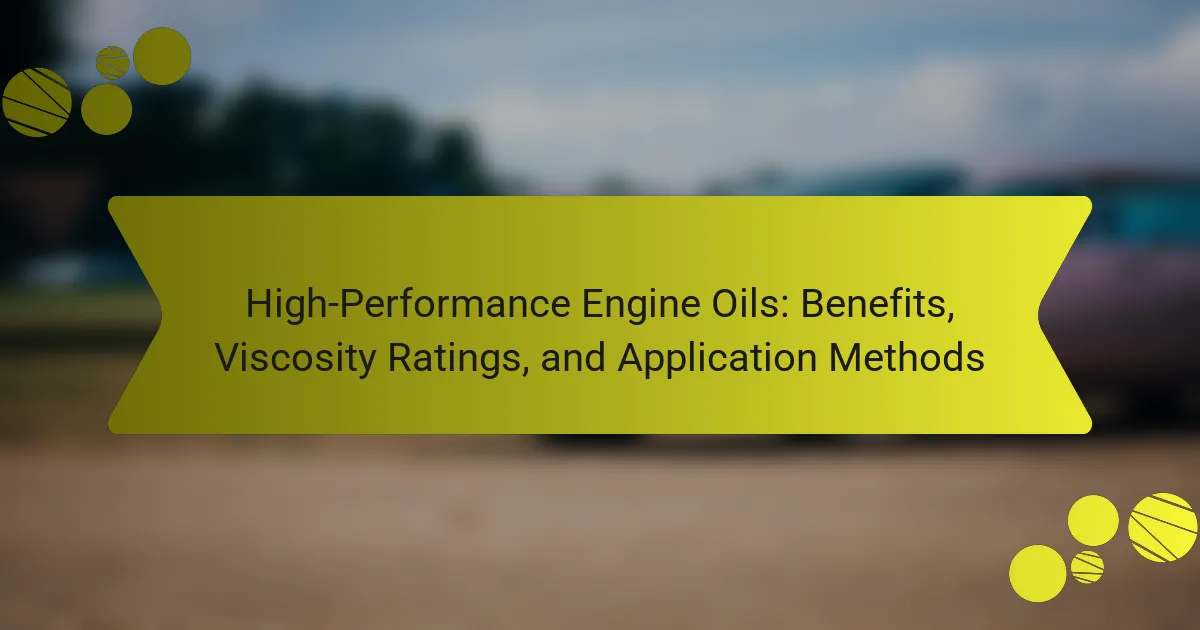High-performance engine oils offer enhanced protection and improved fuel efficiency for your vehicle. This article explores their benefits, viscosity ratings like 0W-20 and 5W-30, and application methods for optimal performance. Understanding these aspects can help you select the right oil for your engine needs. We will also address challenges in choosing high-performance oils and highlight key attributes that differentiate top brands.

What are the key benefits of high-performance engine oils?
High-performance engine oils provide enhanced protection, improved fuel efficiency, and better engine cleanliness. They reduce friction and wear, ensuring optimal performance under extreme conditions. These oils maintain viscosity across temperature ranges, which is crucial for engine longevity. Additionally, they can improve cold start performance and reduce deposits, contributing to overall engine health.
How do high-performance engine oils enhance engine efficiency?
High-performance engine oils enhance engine efficiency by reducing friction, improving lubrication, and maintaining optimal temperature. These oils feature advanced formulations that provide better protection under extreme conditions.
Their viscosity ratings ensure a consistent flow, allowing for quicker engine response and reduced wear. For instance, a synthetic high-performance oil can withstand higher temperatures than conventional oils, enhancing engine longevity.
Application methods vary, with options including direct pouring during oil changes or using specialized systems for continuous lubrication. This versatility helps maintain engine performance across different driving conditions.
What role do high-performance engine oils play in engine longevity?
High-performance engine oils significantly enhance engine longevity by providing superior lubrication and protection against wear. These oils maintain optimal viscosity across temperature ranges, reducing friction and heat buildup. They also contain additives that prevent sludge formation and corrosion, ensuring cleaner engine operation. As a result, engines run more efficiently and last longer.
Why are high-performance engine oils critical for extreme driving conditions?
High-performance engine oils are essential for extreme driving conditions as they provide superior protection and performance. These oils maintain viscosity at high temperatures, reduce wear, and prevent engine sludge. Enhanced additives improve stability under stress, ensuring optimal engine function. In extreme conditions, such as racing or off-roading, high-performance oils minimize friction and enhance fuel efficiency.

What are the different viscosity ratings for high-performance engine oils?
High-performance engine oils typically have viscosity ratings such as 0W-20, 5W-30, and 10W-60. These ratings indicate the oil’s flow characteristics at different temperatures, ensuring optimal engine performance under various conditions. The first number represents the oil’s viscosity at low temperatures, while the second number indicates viscosity at high temperatures. For example, a 5W-30 oil performs well in cold starts and maintains stability at high temperatures.
How do viscosity ratings affect engine performance?
Viscosity ratings significantly influence engine performance by ensuring optimal lubrication under varying temperatures and conditions. Higher viscosity oils provide better protection at high temperatures but may increase drag, while lower viscosity oils enhance fuel efficiency and cold start performance. Selecting the appropriate viscosity rating based on engine specifications and operating conditions is crucial for maximizing engine longevity and efficiency.
What is the significance of multi-grade vs. single-grade oils?
Multi-grade oils adapt to varying temperatures, while single-grade oils maintain consistent viscosity. Multi-grade oils provide better engine protection across a wider temperature range, enhancing performance and efficiency. Single-grade oils may be suitable for specific conditions but lack versatility. The unique attribute of multi-grade oils is their ability to perform optimally in both cold and hot environments, making them ideal for diverse driving conditions.
Which viscosity ratings are most recommended for specific vehicle types?
For high-performance vehicles, 0W-20 and 5W-30 viscosity ratings are most recommended. These ratings provide optimal engine protection and efficiency under various conditions. Sports cars typically benefit from 10W-60 oils for enhanced performance at high temperatures. Diesel engines often require 15W-40 for better lubrication and wear protection.

How are high-performance engine oils formulated?
High-performance engine oils are formulated through a precise blend of base oils and advanced additives. These oils enhance engine efficiency, reduce friction, and improve longevity.
The formulation typically involves selecting high-viscosity index base oils, which maintain their viscosity across temperature ranges. Additives like detergents, dispersants, and anti-wear agents are included to enhance performance.
The unique attribute of high-performance oils is their ability to withstand extreme conditions, such as high temperatures and pressures, which standard oils may not endure.
As a result, these oils provide superior protection and performance, making them ideal for high-performance and racing engines.
What additives are commonly found in high-performance engine oils?
Common additives in high-performance engine oils include detergents, dispersants, anti-wear agents, friction modifiers, viscosity index improvers, and antioxidants. These additives enhance performance, protect against wear, and improve engine cleanliness. For instance, detergents help keep engine parts clean, while anti-wear agents reduce friction and wear during operation.
How does synthetic oil differ from conventional oil in performance?
Synthetic oil generally outperforms conventional oil in engine protection, stability, and efficiency. Synthetic oils provide better lubrication at extreme temperatures, reducing engine wear and enhancing fuel economy. They typically have superior viscosity ratings, maintaining their performance over a wider temperature range. Additionally, synthetic oils resist oxidation and breakdown, offering longer intervals between oil changes compared to conventional oils.

What application methods are recommended for high-performance engine oils?
High-performance engine oils are best applied using methods such as direct pouring, using a funnel, or through an oil extraction pump. These methods ensure proper distribution and minimize contamination. For optimal performance, follow the manufacturer’s guidelines on viscosity ratings and application frequency.
How should high-performance engine oils be applied during an oil change?
High-performance engine oils should be applied according to the manufacturer’s specifications during an oil change. Start by draining the old oil completely, then replace the oil filter. After that, add the new high-performance oil gradually, checking the level with the dipstick to ensure proper viscosity. It’s essential to choose an oil with the correct viscosity rating for your engine type, as this affects performance and protection. Finally, run the engine briefly and check for leaks to confirm a successful application.
What are the best practices for maintaining optimal oil levels?
To maintain optimal oil levels, regularly check and top off engine oil as needed. Use high-performance engine oils that match your vehicle’s specifications for viscosity and application methods. Consistent monitoring prevents engine wear and ensures efficient performance. Change oil at recommended intervals to maintain oil quality and effectiveness.

What challenges do users face when selecting high-performance engine oils?
Users face several challenges when selecting high-performance engine oils, including understanding viscosity ratings and compatibility with their engines. Many struggle to identify the right oil for specific performance needs, leading to potential engine damage. Additionally, the vast array of products can create confusion regarding the best formulations. Users may also encounter misleading marketing claims, making it difficult to discern genuine benefits. Lastly, the cost of high-performance oils can deter some consumers, despite their potential long-term advantages.
How can users identify counterfeit high-performance engine oils?
Users can identify counterfeit high-performance engine oils by checking for authenticity labels, verifying viscosity ratings, and examining packaging quality. Authentic oils usually feature holograms or QR codes that link to manufacturer websites. Additionally, users should confirm the viscosity rating matches the specifications for their engine. Packaging should be free of defects and display consistent branding. These indicators help ensure the oil’s performance and protect engine integrity.
What common misconceptions exist about high-performance engine oils?
High-performance engine oils are often misunderstood. Common misconceptions include the belief that all engine oils are the same, which ignores the unique benefits of high-performance oils. Many think higher viscosity ratings always mean better protection, while in reality, the right viscosity depends on the engine’s specific requirements. Some believe these oils are only for racing or high-performance vehicles, but they can enhance efficiency in everyday cars too. Lastly, the idea that synthetic oils are unnecessary is misleading; they often provide superior protection and longevity compared to conventional oils.

What are the unique attributes of leading high-performance engine oil brands?
Leading high-performance engine oil brands exhibit unique attributes that enhance performance and protection. These attributes include advanced additive technologies, superior thermal stability, and exceptional wear resistance.
Advanced additive technologies improve engine cleanliness and reduce friction. Superior thermal stability allows oils to perform effectively under extreme temperatures, maintaining viscosity. Exceptional wear resistance prolongs engine life by minimizing metal-to-metal contact.
Brands often differentiate through unique formulations tailored for specific engine types, such as synthetic blends or fully synthetic oils. Rare attributes may include eco-friendly formulations that reduce environmental impact without sacrificing performance.
How do specialized formulations differ among top brands?
Specialized formulations among top brands differ primarily in their viscosity ratings and additive technologies. These variations impact engine performance, fuel efficiency, and protection under different driving conditions.
For example, some brands focus on high-temperature stability, while others emphasize low-temperature fluidity. This specialization allows consumers to select oils tailored to specific engine types and operating conditions.
Furthermore, unique formulations may include proprietary additives that enhance wear protection or improve cleanliness. Rare attributes, like eco-friendly components, also distinguish certain brands, appealing to environmentally conscious consumers.
Ultimately, understanding these differences enables users to choose the most suitable high-performance engine oil for their vehicles.
What innovations are being introduced in high-performance engine oils?
Innovations in high-performance engine oils include advanced synthetic formulations, improved viscosity stability, and enhanced wear protection. These developments lead to better fuel efficiency and longer engine life. New additive technologies are also being introduced to reduce friction and improve resistance to thermal breakdown. As a result, modern high-performance oils can operate effectively under extreme conditions, ensuring optimal engine performance.

What rare attributes should consumers look for in high-performance engine oils?
Consumers should look for rare attributes like synthetic base stocks, high thermal stability, and advanced friction modifiers in high-performance engine oils. These traits enhance lubrication, reduce wear, and improve engine efficiency. Synthetic base stocks provide superior performance in extreme conditions, while high thermal stability ensures oil maintains its properties under heat. Advanced friction modifiers can enhance fuel economy by reducing internal engine friction. These rare attributes significantly differentiate high-performance engine oils from standard formulations.
How do eco-friendly formulations impact performance?
Eco-friendly formulations can enhance performance by providing effective lubrication while reducing environmental impact. These oils often contain biodegradable components that maintain viscosity and protect engine components. Additionally, they can improve fuel efficiency, leading to lower emissions. High-performance engine oils formulated with eco-friendly ingredients can meet or exceed industry standards, ensuring optimal engine protection and longevity.
What are the benefits of oils designed for specific engine types?
High-performance engine oils provide enhanced lubrication, improved efficiency, and better protection for specific engine types. These oils are formulated to withstand higher temperatures and pressures, ensuring optimal performance.
Benefits include reduced engine wear, improved fuel economy, and enhanced engine cleanliness. The viscosity ratings of these oils are tailored to meet the demands of high-performance engines, ensuring proper flow and protection under extreme conditions.
Application methods vary, with some oils designed for easy integration into existing systems. This adaptability makes them suitable for both racing and everyday high-performance driving.
What are expert tips for maximizing the benefits of high-performance engine oils?
To maximize the benefits of high-performance engine oils, choose the correct viscosity rating and follow recommended application methods. Regularly check oil levels and change intervals to maintain optimal engine performance. Use high-quality filters to prevent contaminants and ensure proper lubrication. Consider synthetic options for enhanced protection and efficiency.



